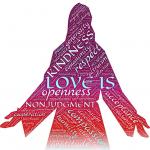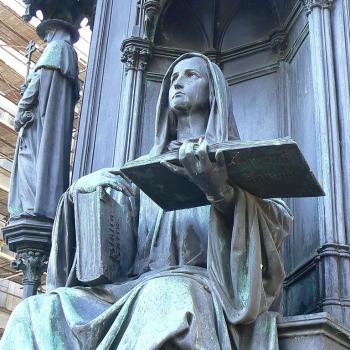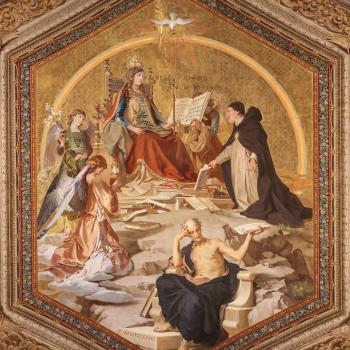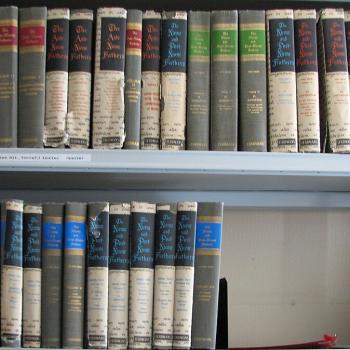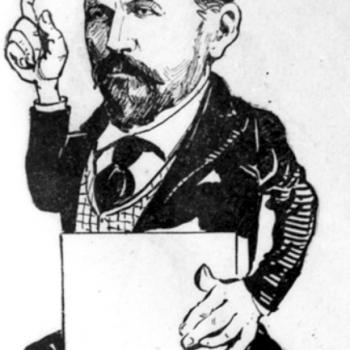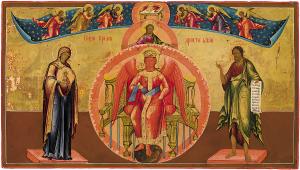
Modern process theology, developed in the twentieth century, is one of the most controversial ways to theologize about God. Process theologians reject the normative theological tradition in the way it describes God. Instead of saying God is eternal, unchanging (because he is eternal), omnipotent, omniscient, and omnipresent, process theologians say God is viewed as being in time, as changing with time, and therefore, possessing limits to his knowledge and power. Process theologians believe that the traditional view of God is untenable. Theodicy is often one of the many reasons why they suggest this: if God is all good and all powerful, how could there be any pain or suffering, or any experience of evil in creation? They believe that if God is limited in power, changing with the universe, he can be vulnerable and incapable of preventing such evil. Those who have studied traditional theology know the way it would respond to the objections of process theologians; perhaps the most important criticism they would offer is how process theologians are too tied to the human intellect and what it can establish for itself. Likewise, process theologians create a dualistic vision of reality: God is seen as one constituent to the universe. Matter would be seen as existing alongside and separate from God. God is seen as having some power to shape and influence the universe, but because such matter exists alongside him in eternity, that power would be limited (and indeed, in some ways, the rest of the universe would likewise have some power to shape and influence God). This would mean that God turned more into the Platonic demiurge rather than being God. In reply to this, we can consider the implications of Proclus’ philosophy: the one must be seen as proceeding the many. What is one does not need multiplicity for it to exist, but what is multiple reflects and engages the one, coming from it for its existence. If God and something external to God, such as matter, existed side by side, then that would be the “two” which needs some overarching “one” behind them, and that “one” is what is normally considered to be God instead of the demiurge which is side by side with the rest of creation.
Nonetheless, despite this fault, and the criticism which can emerge with the dualism inherent with process theology (and the various ways such dualism can be rejected), there are elements of process theology which are important, elements which all theologians should be concerned about and try to reflect upon in their own works. Questions of theodicy certainly are among them, but they are not the only ones. The role of evolution, the way creation itself is seen to exist in some sort of process, with its own manifold paths of change and development, is something which no theology should discount. Process theology, as Jay McDaniel explains, takes this seriously, because it suggests creation itself shares in the process of its own development
Process theologians pass through the door, and I think we must as well. They believe that errors, dead end, and false trails occur in the evolutionary process, not necessarily because God wills them, and not necessarily because God allows them, but rather because nature has creativity in its own right.[1]
In this way, we can begin to see evolution as a way in which creation shares in its own continued generation; by seeing that God has given creation this ability will also be able to serve as a way to explain evil. God does not will evil, but in allowing creation to generate itself, the process by which it chooses that generation can result in pre-moral evils, if not outright moral evil. Suffering and evil are not willed by God, but the pathways in which creation generates itself allows for both to be produced.
Nonetheless, as important as these insights are, and as much as Christians should accept them, they do not demonstrate the need to view God in the dualistic fashion established by process theology. God, and especially his eternity, transcends us and our comprehension; God is beyond time while he made the space needed for time to exist, and with time, creation then can engage in its own becoming. For God, all of time, with its changes, is viewed and experienced in his unchanging eternity: it is this paradox which confuses us and makes us think God himself must somehow change if he in his eternal activity allows for change in time. It is only a matter of perspective. For God, even our change remains unchanging to him, because all the change will be known in his unchanging eternity.
While these, and many other questions, can be and should be examined so that creaturely freedom (and even divine freedom) can both remain. Reflections which examine the relationship between becoming and being, time and eternity, must be done. When we do so, we can realize that process theologians, despite their dualism, are onto something, but what they are examining is not God, but a reflection of God in creation. God in his nature, in his eternity, can be said to be Sophia, Wisdom, realized in the Father, Son and Holy Spirit; that Wisdom, which is the eternal Wisdom of God, as “being itself.” Yet, in establishing creation, God uses his Wisdom, his nature, to establish a foundation which reflect his own nature. This foundation then can be said to be Wisdom, but it is Created Wisdom instead of Uncreated Wisdom. It is not God, the Divine Being, but rather that which God made as the blueprint of his creation, the “World Soul” or “Created Sophia” who in its becoming is the ultimate manifestation and reflection of his Divine Nature in creation. Sergius Bulgakov, in this fashion, explained:
The created world, then, is none other than the creaturely Sophia, a principle of relative being, in process of becoming, and in composition with the non-being of “nothing”; this is what it means when we say that the world is created by God from nothing. Nevertheless, though the positive principle on which the world is based belongs to the being of God, the world as such maintains its existence and its identity distinct from that of God. Although its whole being depends upon the divine power of the creaturely Sophia within it, nevertheless the world is not God, but only God’s creature. There is no such ontological necessity for the world that could constrain God himself to create it for the sake of his own development or fulfillment; such an idea would indeed be pure pantheism.[2]
God in himself is Uncreated Sophia; God in making space for creation gave to creation its own integral unity, Created Sophia, which acts and reacts in the way process theologians believe God acts. It reflects God, which is why it is easy to confuse it for God, and indeed, there is a connection between it and God, but yet the distinction remains: creation has its own heart, its own center, which reaches for eternity and the eternal prototype of the Divine Nature. “God bestowed on the world at its creation not only the fullness of its ideal form as present to his own mind, but also the capacity to maintain its own distinct existence.”[3]
Once we begin to see that there is both an Uncreated Sophia (God), and a Created Sophia, we can better understand many passages about Wisdom in Scripture. Some of them discuss Uncreated Sophia (God), while others present to us the reflection of God within creation, Creaturely Sophia. The problem many have had reading Scripture is that they can easily confuse the two through equivocation. In this way, if we understood the distinctions, we should have no problem seeing the Book of Proverbs talks about Creaturely Sophia when it talks about Wisdom being established at the beginning of creation:
The LORD created me at the beginning of his work, the first of his acts of old. Ages ago I was set up, at the first, before the beginning of the earth. When there were no depths I was brought forth, when there were no springs abounding with water. Before the mountains had been shaped, before the hills, I was brought forth; before he had made the earth with its fields, or the first of the dust of the world. When he established the heavens, I was there, when he drew a circle on the face of the deep, when he made firm the skies above, when he established the fountains of the deep, when he assigned to the sea its limit, so that the waters might not transgress his command, when he marked out the foundations of the earth, then I was beside him, like a master workman; and I was daily his delight, rejoicing before him always, rejoicing in his inhabited world and delighting in the sons of men (Prov. 8:22-31 RSV).
Instead of being used to determine the Logos as Creaturely Wisdom, that passage should be read as saying that Creaturely Wisdom was established by the Logos (for all things were made through the Logos). Likewise, when we read, “Wisdom builds her house, but folly with her own hands tears it down” (Prov. 14:1 RSV), we can understand it also is about Creaturely Wisdom and the slow process by which creation establishes itself in time. Creaturely Wisdom can be undone by its own creations, that is, by the folly of those who ignore her prompting. Those who ignore its prodding are foolish, and in their folly, they embrace the destruction of being instead of its promotion, destruction which leads to the pain and suffering, to the evils, experienced in creation. Created Sophia can direct us with her becoming to Divine Sophia, but creaturely freedom, those creatures made by the evolutionary processes in the realm of becoming, allows us to go against such Wisdom and to engage in the folly which is labeled as “sin.” Nonetheless, even with such sin, Wisdom continues to direct us to God, to be passed down from generation to generation to help redirect the world and its becoming:
For she is a breath of the power of God, and a pure emanation of the glory of the Almighty; therefore nothing defiled gains entrance into her. For she is a reflection of eternal light, a spotless mirror of the working of God, and an image of his goodness. Though she is but one, she can do all things, and while remaining in herself, she renews all things; in every generation she passes into holy souls and makes them friends of God, and prophets; for God loves nothing so much as the man who lives with wisdom (Wis. 7:25-28 RSV).
Vladimir Solovyov, describing the way Creaturely Sophia, “the World Soul” is the integral unity behind creation, explains how, in the process of creation, it manifests itself in the way it mixes with the chaos which lies behind all becoming:
The definite form of all-unity or of the universal organism is contained in the Divinity as an eternal idea. In the world, on the other hand – i.e., in the aggregate of elements (of all that exists) which came out of unity – in this world, or rather, in this chaotic state of the existence of all (which had constituted the primordial fact) the eternal idea of the absolute organism had to be gradually realized; and the effort of that realization, the striving towards the incarnation of Divinity in the world – this striving is universal, one in all, and therefore transcends the limits of each — is the striving which, representing the inner life and beginning of movement in all that exists, is the world soul, properly speaking. And if, as it has been stated, the world soul by herself cannot realize herself because she lacks a definite positive form [necessary] for that purpose; then it is obvious that in her impetus towards the realization [of the striving] she must look for that form in another [one]; and she can find it only in the one who eternally contains that form, i.e., the divine beginning: which thus appears as the active, formative, and determining principle of the world-process.[4]
Sophiology, the study of Sophia, be it Divine or Uncreated Sophia, or its reflection in creation as Creaturely Sophia (or some further derivative of Sophia seen in humanity, in the church, in Mary, or some other element of creation) takes the evolutionary process of becoming seriously while finding a way to preserve the non-dualistic eternity of God. Evolution and modern science have given us reason to reflect further on the processes behind creation. Sophiology, starting with Vladimir Solovyov, has been one way which such evolutionary processes have been accepted by various Christian theologians and philosophers. Because it is capable of retaining the basic dogmatic teachings concerning the divine nature while taking seriously the concerns of modern process theology, it offers us a way beyond the problems normally associated with process theology. It is not necessarily the only way to reflect upon these issues and answer them, and it has challenges and difficulties of its own (with some possible Gnostic temptations which must be avoided for it to be acceptable), but as a whole, for those interested in process theology while wanting to take more seriously traditional theistic teachings about God (and by doing so, to avoid any unnecessary dualism), it is in invaluable system of thought which provides the hermeneutic necessary to combine traditions which otherwise might seem to be incompatible with each other.
[1] Jay B. McDaniel, Of God and Pelicans: A Theology of Reverence For Life (Louisville, KY: Westminster/John Knox Press, 1989), 35.
[2] Sergie Bulgakov, Sophia: The Wisdom of God. Trans. Patrick Thompson, O. Fielding Clarke and Xenia Braikevitc (Hudson, NY: Lindisfarne Press, 1993), 72.
[3] Sergie Bulgakov, Sophia: The Wisdom of God, 70.
[4] Vladimir Solovyov, Lectures on Godmanhood. Trans. Peter Peter Zouboff (London: Dennis Dobson Ldt. Publishers, 1948), 177.
Stay in touch! Like A Little Bit of Nothing on Facebook.
If you liked what you read, please consider sharing it with your friends and family!



